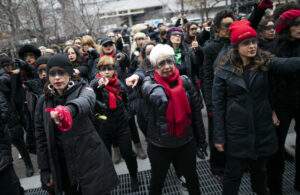(YANN COATSALIOU/AFP/Getty Images)
It took a few weeks to hand out questionnaires and vet hundreds of potential jurors but considering the sturm und drang surrounding the Harvey Weinstein sex-assault case, a jury was picked relatively quickly, queueing things up for testimony to begin Wednesday.
There was a minor kerfuffle when supermodel Gigi Hadid showed up in the venire, but it was a welcome diversion considering there’s nothing more boring for reporters than watching sidebar conferences and days of voir dire.

(Photo by Kena Betancur/Getty Images)
At one point the action outside was more interesting than inside when a group of black-clad women with red scarves and dark stockings wrapped around their eyes formed a flash mob on the sidewalk, pointing toward the courthouse.
During jury selection, prosecutors protested what they saw as defense systematically striking young white women from the panel. Defense attorneys voiced objections when they learned that a woman author, whom both parties selected, was writing a novel about the relationship between a young woman and a predatory older man. While she stated she was a novelist on her jury questionnaire, she failed to include the subject of her book. The judge, however, refused to unseat her or grant a mistrial.
The makeup of the jury is mostly white males including an Upper East Side businessman, a banking executive and the managing partner of an investment firm. Only two white women were seated, the novelist among them.
Both sides denied they’d struck potential jurors based on race, gender, or age, but that’s always a factor in determining jury makeup. Why? Conventional wisdom has it that everyone relates more to the party that looks like them. Successful professional businessmen (especially older ones) might see Weinstein as “there but for the grace of god, go I.” Whereas, working women who’ve experienced sexual harassment on the job are more likely to sympathize with the complainants.
The judge made clear that the case is “not a referendum” about the #MeToo movement, but by permitting four women not named in the indictment to testify about how they were sexually assaulted by Weinstein (the prosecutor couldn’t charge this in the indictment because of the statute of limitations), the scale is tipped against the former movie mogul. Sure, jurors will be instructed that they can’t consider these witnesses’ testimony to show Weinstein has a criminal propensity to sexually assault women. But jurors are only human. As we saw with the Bill Cosby conviction, there’s strength in numbers.
In this early stage, it appears the prosecution has the wind at their backs. Weinstein has been vilified globally and the #MeToo movement is widely lauded as a way for women to even the score after having been subjected for decades to sexual harassment at the workplace.
But the case won’t be easy. Although the prosecution has poised, educated, well-spoken female witnesses, defense attorneys will key into every minute inconsistency, the fact that the women didn’t report the abuse for years, and that many stand to gain civil judgments through lawsuits against Weinstein.
There’s also the problem of Detective Nicholas DiGaudio who allegedly told a complainant (now dropped from the indictment) to delete information from her cell phone that would have been favorable to Weinstein. Any witness with whom DiGaudio had interactions before he was kicked off the case will be undermined by that fact.
Defense attorneys will imply through cross-examination that each complainant was a willing accomplice to Weinstein’s advances. They knew he was a powerful man and that being with him could lead to getting better jobs. In many cases, they continued either working for him or socializing with him even after the alleged criminal acts occurred.
While it’s fair game to question a witness’s motive and credibility, however, it’ll be a tightrope walk for defense attorneys not to alienate jurors by “blaming the victim.”
One thing I’d stake money on -– Weinstein himself will not take the stand. The case is about whether the prosecution can prove its case against him, not whether Weinstein is actually innocent.
The only reason to have Weinstein testify is because he has a reasonable story to tell or to gain some sympathy. Sympathy is out of the question even though he’s using a walker to amble to and from court. The accusations against him are too widely cast in number of victims and time frame. No one will feel sorry for him. Furthermore, it’s unlikely any story he’d tell would counter the detailed versions complainants will give. Because of the number of witnesses scheduled to testify against him, there’s just too much to explain away.
Taking the stand would only shift the burden from whether Weinstein committed these crimes to whether he’s as sleazy a customer as he appears to be. That’s a risk he can’t afford to take.
Toni Messina has tried over 100 cases and has been practicing criminal law and immigration since 1990. You can follow her on Twitter: @tonitamess.

